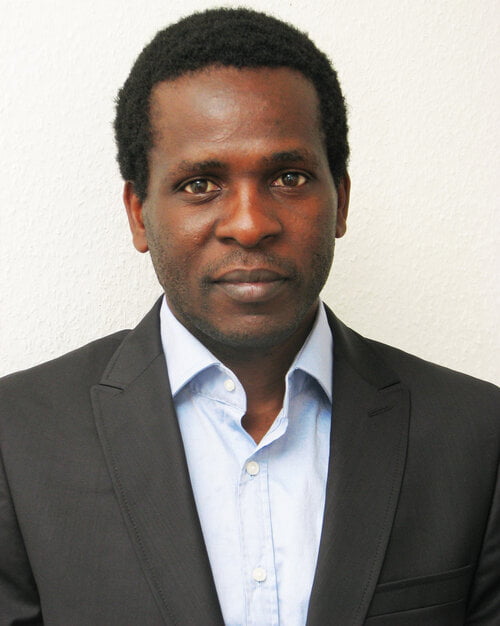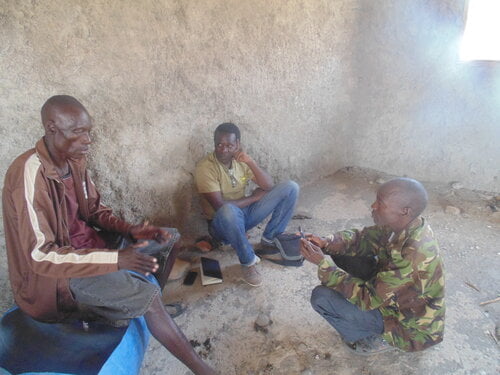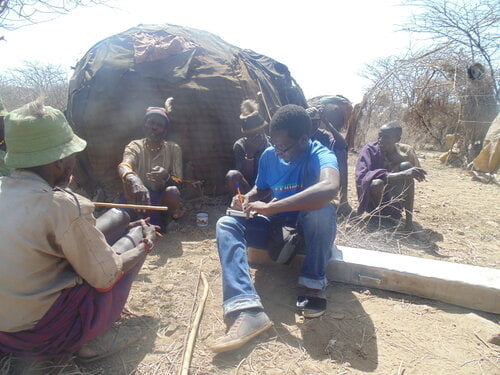
Image credit: Willis Okumu
The fourth interview in our “Paper Trails” series is with Dr Willis Okumu, a social anthropologist based in Kenya. Dr Okumu’s PhD studied the colonial roots of inter-communal violence among pastoralist communities in Northern Kenya. He is currently researching experiences of human trafficking among young people in Kenya, in collaboration with the Anti-Slavery Knowledge Network at the University of Liverpool.
MBC volunteer Emily Beswick spoke to him about how British colonialism impacted pastoralist communities in Northern Kenya, and how as an anthropologist, he confronts the colonial history of his discipline.
MBC: Could you briefly tell me about your research and what archives you are using?
Dr Okumu: My PhD was in the discipline of social anthropology, looking at meanings of violence among pastoralist communities in Northern Kenya. Pastoralist communities, such as the Samburu and Turkana people, herd livestock and live at varying levels of mobility.
In 2013, there was a lot of violence happening in Samburu county. Having previous research experience in Northern Kenya, I felt I could give a deeper understanding in terms of social and political relations among communities. When I went there, I realised that the violence was not just political – it had cultural dynamics and economic dynamics too.
I wanted to understand how communities in Northern Kenya became armed in the first place. Among the Samburu, the colonial army wanted to use local young people and their communities to weaken competing communities in the same neighbourhood. And therefore, they literally armed some of these communities so they could fight their enemies. During the Second World War, some of the people who were recruited by the colonial government of Kenya were from these so-called “warrior” communities.
I realised it was essential to understand how colonialism impacted these communities. I spent three months researching at the Kenya National Archives in Nairobi, and also went to Northern Kenya to interview retired chiefs.
“Colonial incursion into Northern Kenya brought about different societal structures that were never there. The colonial system brought in chiefs, and the chief was always given a gun – and an army to help him administrate.”
What do you mean by “meanings of violence”?
Conflict or violence communicates different messages. During the research, we noted that when somebody is killed, different cultural meanings are drawn from the act. For example, if a Turkana person killed a fellow Turkana, it is an abomination, it is wrong, and you could be banished from the community. Your own family is thrown out and you lose a lot of social relations. But when you kill a member of an enemy community, it is not a crime: it is an act of heroism. How people interpreted violence against their enemies was something I found very interesting.
And did you find that the experience of colonialism affected the meaning of violence among these pastoralist communities?

Willis conducting field work in Parkati village, Samburu county. Image credit: Willis Okumu
Exactly! Colonial incursion into Northern Kenya brought about different societal structures that were never there. Most of the Pastoralist communities had been very egalitarian; they were governed by Councils of Elders and through groups of people who were designated responsible. The colonial system brought in chiefs, and the chief was always given a gun – and an army to help him administrate.
Up to today, in North Kenya, the Kenya Police Reservists [an auxiliary police force] work very closely with chiefs and are armed by the state. Because of the continued marginalisation of Northern Kenya, there is limited state authority in the use of violence. In many cases, arms and ammunition given by the state – a practice which started during colonial times – are still used against citizens of the country. While the use of arms against enemy communities is illegitimate by law, it is culturally legitimate.
To understand the colonial history of these pastoralist communities, which documents did you use in the Kenyan national archives?
We looked at colonial administrative correspondences from the year 1910 to independence in 1963. The first one was an administrator who travelled from Nairobi all the way to Ethiopia, then called Abyssinia. He passed through Samburu land, as it was called in those days, documenting the kind of situations people were experiencing.
At the time, there was a big rift between the Samburu and the Turkana. As he was a white man, the communities approached him and held a baraza [community meeting]. The voices of the two chiefs are recorded in the archive. The demands they made on the colonial administration are documented. But of course, it’s recorded through the administrator’s voice and it is left with him to make the decision on the way forward.
We also looked at letters of colonial administrators, most of whom were British people. We studied how they were doing their work; the kind of challenges they faced; which community was fighting against which one; how many livestock had been stolen; and what the police-community relations were like at that time. The administrators documented the numbers of young warriors from these communities who went to help the British government in WW2, and how many of them came back, how many of them disappeared, and how many of them were given jobs in the police, how many were absorbed into the government system.
“Colonial history helps us understand that the violent relations we witness among many marginalised communities in Eastern Africa and beyond were started by colonial governments giving people guns so that they could govern themselves.”
How did oral interviews of retired chiefs then fit into your archival research?
In the case of Northern Kenya, I would say written sources were almost exclusively European voices. We needed interviews to corroborate the data we got from the archives. If you mentioned a European administrator that you had gotten from an archival source, the people of that generation would relate with that, and confirm that “my father told me he was here”.
More broadly, do you see your work as relevant to discussions around colonialism in Kenya today?
Research on colonial history makes an important contribution to understanding global inequalities.
Northern Kenya faces challenges of serious underdevelopment, marginalisation and this culture of violence – these issues have persisted for a very long time. Many Kenyans look at people from Northern Kenya as inherently violent people, as people who refuse development. But looking at the history, you understand that the colonial government never treated them as human beings. The culture of violence that has persisted was actually initiated by the colonial government, and nurtured by the independent Kenyan government.
Colonial history helps us understand that the violent relations we witness among many marginalised communities in Eastern Africa and beyond were started by colonial governments giving people guns so that they could govern themselves.
“I totally don’t agree with how, in many social science disciplines, the subject or the respondents of the study – who are actually the source of knowledge – are never seen as on the same level as the researcher. The anthropologist always imagines that they are superior.”
Anthropology is a discipline historically linked to colonialism. Has your research caused you to reflect on that history – and how do you come to terms with it?
The literature of many past anthropologists was undoubtedly very racist. Their view of local communities is appalling, and for a long time, this work was celebrated. You read documentation that describes local people as almost semi-human beings, people that are probably not on par with the person doing the research, who in practice is the person actually gaining the information!
I totally don’t agree with how, in many social science disciplines, the subject or the respondents of the study – who are actually the source of knowledge – are never seen as on the same level as the researcher. The anthropologist always imagines that they are superior. Research by scholars from various disciplines gained so much from communities, but they never acknowledged those communities, and in many cases abused those communities! They built serious names and serious careers based on knowledge that was not theirs.

I think it is important going forward that we as scholars appreciate and acknowledge that the knowledge that we share with the world is not our own. We could have the methodology and the theory in our head, but we need that local information, and that local person, to give the essential context.
Image credit: Willis Okumu
When you are doing your fieldwork, how do you not reproduce that power relation between the researcher and their respondents?
One of the things I was very keen on was to always acknowledge the people that I worked with very closely. In most of my published work, there is at least one person who is a co-author from the communities themselves. These are people who may not actually need this academic paper or book, but it is in their name! It is an appreciation of their effort.
I think it is important going forward that we as scholars appreciate and acknowledge that the knowledge that we share with the world is not our own. We could have the methodology and the theory in our head, but we need that local information, and that local person, to give you the essential context.
Finally, what are you working on now?
In collaboration with the University of Liverpool, I’m researching youth experiences of human trafficking in Kenya. I’m documenting youth experiences in ten counties in Kenya, trying to understand how the whole phenomenon of human trafficking is affecting young people who are trying to move and get a living.
You can follow Willis on Twitter @willokumu and access his publications here.